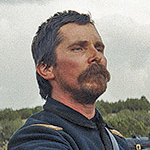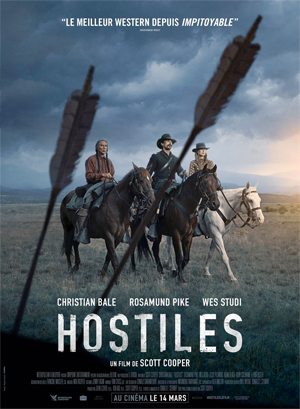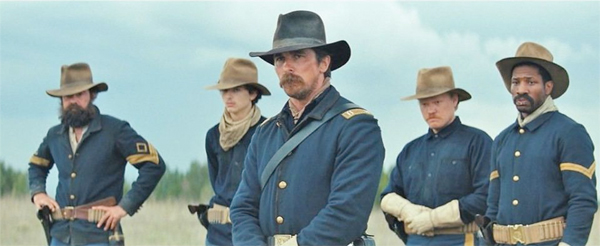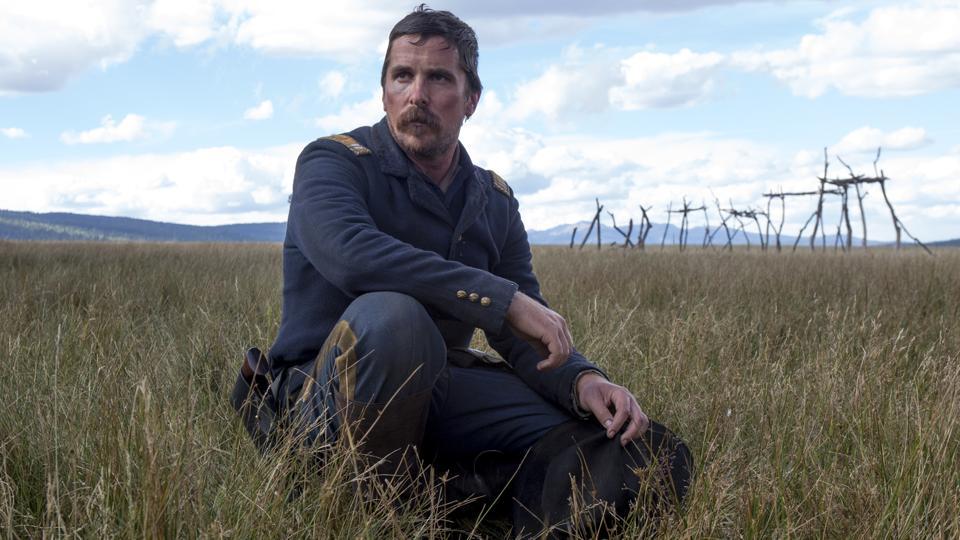 Scott Cooper is an actor-turned-writer/director who seems slightly under the radar to me. He made a splash with CRAZY HEART ten years ago, a movie that somehow seems overshadowed by Jeff Bridge’s Oscar-winning performance in it (and that I thought of a few times watching A STAR IS BORN). His followup, the gloomy crime drama OUT OF THE FURNACE (2013), teamed him with Christian Bale (POCAHONTAS) for the first time, and I have to admit that I have not seen his poorly reviewed BLACK MASS (2015). But he didn’t write that one. I only watch the ones he directs and writes, obviously.
Scott Cooper is an actor-turned-writer/director who seems slightly under the radar to me. He made a splash with CRAZY HEART ten years ago, a movie that somehow seems overshadowed by Jeff Bridge’s Oscar-winning performance in it (and that I thought of a few times watching A STAR IS BORN). His followup, the gloomy crime drama OUT OF THE FURNACE (2013), teamed him with Christian Bale (POCAHONTAS) for the first time, and I have to admit that I have not seen his poorly reviewed BLACK MASS (2015). But he didn’t write that one. I only watch the ones he directs and writes, obviously.
2017’s HOSTILES (based on a manuscript written by Donald E. Stewart [JACKSON COUNTY JAIL, DEATHSPORT, THE HUNT FOR RED OCTOBER, PATRIOT GAMES, CLEAR AND PRESENT DANGER] in the ’80s) reteamed him with Bale for what might be categorized as a Real Serious Western – the kind where the director is hesitant to call it a western (“I don’t think in terms of genre… If anything it’s a psychological western in the vein of Anthony Mann…I don’t think it’s a western, it has more in common with Joseph Conrad or Larry McMurtry or Louis L’Amour” he told Moviemaker) and you want to grab them and tell them “all right cool it buddy, just admit you made a really good western.” (See also THE REVENANT.)
But I guess I sort of get it. A completely traditional western is not very marketable in this day and age. Most people don’t really want the genre without a little bit of a new spin on it, and HOSTILES has one.
It also has many familiar elements that are enjoyable in modern westerns: a group of people journeying through dangerous territory, transporting prisoners, an uneasy alliance between colonists and natives, a woman who proves her salt, soldiers who have grown tired of war, a man of violence who starts to grow a conscience. I think there are two things that put those elements in a context just different enough to feel like a new take on the material, for those who require such a thing.
 Number one, there’s Bale’s performance as Captain Joseph Blocker. Alot of guys, sometimes including Bale, dive head first into a period character and they get all their costuming and facial hair and an old timey accent and some mud and blood on their face and their instinct is to just go at the scenery like a fuckin pitbull. And that can be great, I got nothing against that. But in this case Bale is able to combine all the attention to detail with some nuance and naturalism. He gets that big ol’ mustache and he sticks his chin out and looks like one of those faces that you only see in old civil war photographs. And he mumbles. But he’s not going for yelling and vein popping and spitting. He’s quiet. He makes us watch him.
Number one, there’s Bale’s performance as Captain Joseph Blocker. Alot of guys, sometimes including Bale, dive head first into a period character and they get all their costuming and facial hair and an old timey accent and some mud and blood on their face and their instinct is to just go at the scenery like a fuckin pitbull. And that can be great, I got nothing against that. But in this case Bale is able to combine all the attention to detail with some nuance and naturalism. He gets that big ol’ mustache and he sticks his chin out and looks like one of those faces that you only see in old civil war photographs. And he mumbles. But he’s not going for yelling and vein popping and spitting. He’s quiet. He makes us watch him.
Blocker is immediately despicable, a guy famous for killing countless Indians in war. Hates them. Blisteringly recounts war crimes they committed as justification for his bloodlust. Also plays along when his buddy Metz (Rory Cochrane, PASSION PLAY) reminisces about brutalities that he committed against them. I think there’s a little bit of subtext going on for both of them, but on the surface this is a “those were the good old days” type of conversation about committing atrocities. So he’s never gonna be able to be transformed into an angel.
But he’s complicated. This doesn’t redeem or contradict his racist bloodlust, but it’s still unexpected just how sensitively he treats Rosalie Quaid (Rosamund Pike, DOOM) when he discovers her after her family was massacred by Comanches. He finds her in the charred remains of her cabin, tending to her dead children as if they’re alive. And it’s easy to imagine Clint, Bronson or many others dragging her away, even slapping and yelling at her to break the hysteria cowboy style. Instead he very gently and quietly plays along and lets her carry the baby and gets the other soldiers to keep their distance. He patiently allows her to transition back into reality, giving her the space and support she needs. When she does seem to have snapped out of it they all stand back and watch respectfully, wincing a little with sympathy as she insists on digging the graves herself.

That doesn’t mean he’s not a pig-headed asshole. Ordered by the president to free and transport the dying Cheyenne Chief Yellow Hawk (Wes Studi, ROAD TO PALOMA) and his family to their homeland in Montana, Blocker insists on putting them in shackles, which he keeps locked even after they prove themselves allies through badassery (killing Comanche attackers using their chains and horses as weapons!). We know this will change, but it’s gradual, and he seems embarrassed to admit it. He discusses everything with Yellow Hawk in Cheyenne but when he’s finally convinced to unchain them he doesn’t tell the chief, he turns away and tells his lieutenant Kidder (Jesse Plemons, BATTLESHIP) to do it.
But there is a vulnerability there under that shell, and when it comes out is whenever he loses one of the soldiers he’s fought alongside for years. There’s more than one scene where he cries, and some of them do involve death. But the big one is when he’s gotten his wounded corporal Woodson (Jonathan Majors, WHITE BOY RICK) to the safety of Fort Winslow, and has to say goodbye to him. He tries to get away with leaving him a letter, but Woodson wakes up and talks to him, and they acknowledge that they likely will never see each other again. They talk about how neither of them would be alive without each other. They’ve been through the shit together and become great friends. I think for Blocker it’s a matter of losing the only people in his life who could ever understand the trauma and guilt of having done the things he’s done.
The number two thing – you may have forgotten, but five paragraphs ago I said I was listing the two main things I think make this a distinct western, and we are on the second one – is the movie’s depiction of a world where everything is solved with violence, and yet violence is never a clean solution. Every time we get the action movie kick of these guys being bad motherfuckers, it costs us at least one life. No side ever gets through a skirmish without casualties. Even in a thrilling SEAL-team-six-of-the-Old-West raid on the camp of kidnapping rapist fur trappers, they sneak in like ninjas but not everybody gets out. In the climax Blocker takes a stand for something he never would have imagined taking a stand for at the beginning of this movie. So you get that endorphin rush and everybody at home high fives each other, but after the fight is over and the bodies are buried you can only wonder jesus, was that really the best option we had?
Unsurprisingly this is one of those casts loaded with great actors. Adam Beach plays Yellow Hawk’s son Black Hawk, and though I like that he’s the rare Native American actor primarily known for contemporary roles, he’s also good here. It’s the last film for Scott Wilson (JUDGE DREDD, and Herschel from The Walking Dead) – he plays a racist asshole who doesn’t want them on his land. Stephen Lang (BAND OF THE HAND) is Blocker’s boss at the beginning. Timothee Chalamet is a young soldier who goes with them and I thought “oh wow, this must be his first big role,” but no, it does not turn out to be a big role and it actually came out just after CALL ME BY YOUR NAME and LADY BIRD. Later on, when Blocker agrees to pick up another prisoner for transport it turns out to be Ben Foster (THE PUNISHER, HOSTAGE, 3:10 TO YUMA, THE MECHANIC, HELL OR HIGH WATER) and I thought “Well of course it’s Ben Foster, of course Ben Foster is in this movie. How could I have been so naive?”
That’s an interesting turn of events because his character was a sergeant who fought alongside Blocker and now is in trouble for murdering an innocent Native. By this point Blocker has finally started to learn about the error of his whole life and here’s this asshole who’s disappointed in him for it. But he makes for a pretty clear argument against white supremacy. Fuck that guy.
In HOSTILES, war is hell, the old west is hell, life is hell. Pike is so brilliant at portraying the traumatized widow at the beginning and you’d hope that would be enough tragedy for her. But you keep having to watch her eyes looking on as people she has gotten to know are laying dead. And later we’re reminded (thankfully off screen) why women in particular aren’t safe. I think maybe having her around helps Blocker see it from a different angle. Maybe there are more savages out here than the ones he was focusing on. Maybe all along the real hostiles were–
–oh yeah, I guess that is obviously the meaning of the title, this is not exactly a revelation. It’s a really good movie though.



























February 13th, 2019 at 10:31 am
“I don’t think it’s a western, it has more in common with Joseph Conrad or Larry McMurtry or Louis L’Amour”
I’m not sure about Conrad, but McMurtry and L’Amour, like, totally wrote westerns.